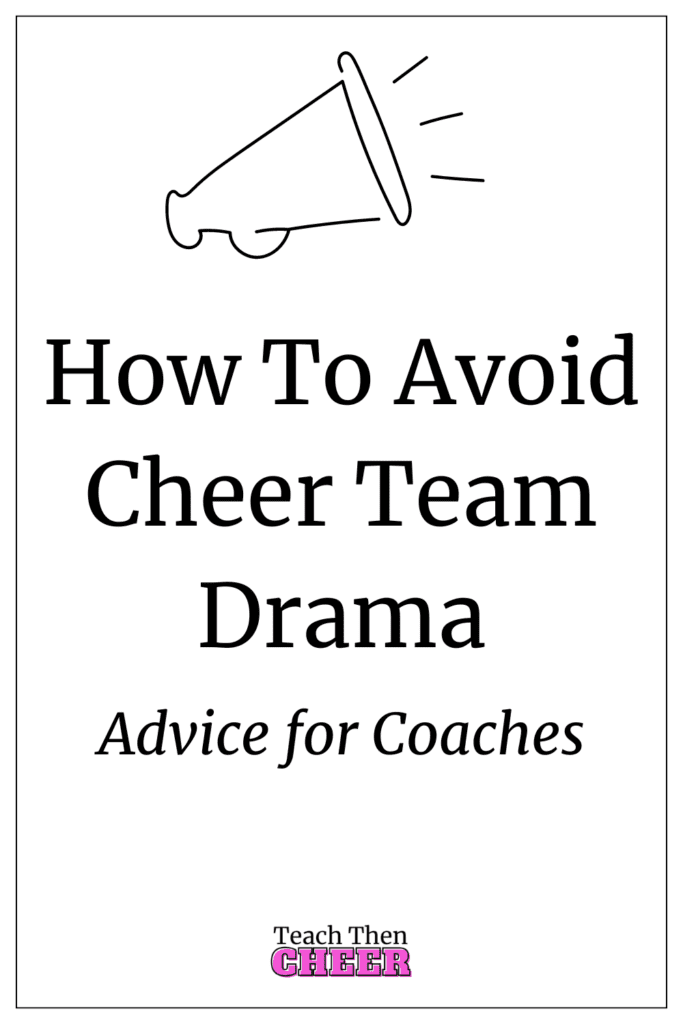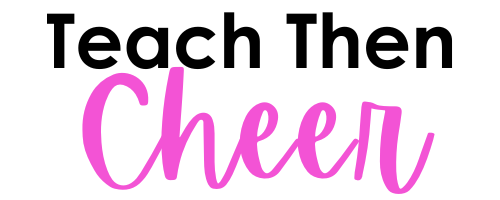How To Avoid Cheer Team Drama

Cheerleading teams are infamous for being full of cheer team drama, but it does not have to be that way!
Cheerleaders are often depicted in the media as catty, mean girls. When I started coaching my goal was to avoid cheer team drama and poor attitudes. I knew that coaching an unhappy and drama filled group would be an uphill battle all year long.
I didn’t want to dread showing up each day to coach. And it would be extremely unfair to these athletes to be in a toxic environment. But I knew that cheer was not the reason that a group of athletes can become catty or have a poor attitude. To be honest, drama can happen with any sport or group. So, I knew that squashing drama was my responsibility and you can do it too!
What is Cheer Team Drama?
- Cheerleaders complaining at practice.
- Cheerleaders talking disrespectfully to their coaches.
- Coaches constantly yelling at the cheer team.
- Cheerleaders making snide remarks about their teammates.
- Cheerleaders being lazy at practice, skipping important events.
But, cheerleading does not have to equal drama. Drama can happen with any group, organization, or team. So that means that drama can be eliminated with any group, organization, and team, including a cheer team!
Why does Cheer Team Drama happen?
- Lack of communication
- Lack of consistency
- Lack of fairness
- Unprepared coaches
- Unprepared cheerleaders
- Imbalance of power
- Undefined roles and responsibilities for coaches, captains, and cheerleaders
How to Avoid Cheer Team Drama as a Cheer Coach
- Create a Cheerleading Contract and Attendance Policy
- Define Roles and Responsibilities
- Be Consistent and Follow Through
- Be Prepared and Prepare Your Team
- Be a Coach, Not a Friend
- Reflect on Your Coaching
Disclaimer: No team is perfect, there will always be challenges. Take each challenge as a learning opportunity and remember that each cheerleader is also learning valuable life lessons during cheer.
Transition and Building Years
If you are taking over a program or there was a big change within your program, there will likely be more friction and tension during the first few years of building a program. But stay persistent and stay consistent. It can and will get better!
Tip 1: Create a Cheerleading Contract and Attendance Policy
If cheerleaders do not have a clear understanding of the expectations and consequences, they will be confused on how to follow the rules.
Before you host tryouts, create a cheerleading contract listing the rules and expectations for the cheer team. Create an attendance policy. You will have cheerleaders miss practice and games.
Check out my post here where I talk about Cheer Team Attendance Policy.
Each rule you create must have a reasonable explanation. Your cheerleaders will respect the rules and expectations when they understand why they are in place.
At your Mandatory Parent Meeting before tryouts, tell the athletes and their families about the cheerleading contract. Have the athletes and a parent sign the contract immediately after they make the team.
Check out my post about the Mandatory Parent Meeting before Cheer Tryouts
A cheerleading contract is a great resource for cheerleaders to refer back to and for you as a coach to refer back to when enforcing the rules.
Tip 2: Define Roles and Responsibilities
If cheerleaders do not know what their responsibility is versus what the coaches are responsible for, they will be confused on when to step up and share their opinion.
I wanted to give credit to Chelsea Pierotti from Passion for Dance. She did an amazing job at going into depth on defining roles and responsibilities. I am a huge fan of her podcast and signed up for her email list. Check her website out: Passionate Coach
Clearly define what are the responsibilities of the coach, the captains, and the cheerleaders. Explain to your cheerleaders what the roles of the coach is. For example, coaches will be in charge of creating stunt groups, lineups, and routines.
Create opportunities for cheerleaders to make decisions and take on leadership roles on the team.
For example, we have our seniors choose the homecoming theme and create a halftime routine. We also ask for their feedback when picking out the practice outfits for the next season. A coach should have final say, but welcome their feedback.
Tip 3: Be Consistent and Follow Through
If cheerleaders see a lack of consistency, they will lose motivation and their effort will decrease.
People appreciate structure. Create a consistent practice routine and stick to it. If you say you plan to do something, make sure you follow through. This builds their trust and respect in you.
Tip 4: Be Prepared and Prepare Your Team
If cheerleaders do not see that their coach is prepared, they will feel frustrated by the wasted practice time.
Set the tone early on by being prepared at cheer tryouts. Check out my post here on the Ultimate Guide to Cheer Tryouts.
Before each practice, event, game, fundraiser, etc., show up with a plan. Time is precious, so the more efficient you can be, the better. I have a practice planner in my Cheer Coach Binder resource.
If cheerleaders do not feel prepared for their routines, they will feel embarrassed and in turn will put forth less effort.
Cheerleaders want to feel confident when they perform their routines. They want to progress in their skills and feel a sense of accomplishment. Use your practice plan to ensure your team is spending enough time practicing the routines, cheers, and sidelines they will perform.
Tip 5: Be a Coach, Not a Friend
Sure, they like you. But do they respect you?
As a coach, building relationships with cheerleaders on your team is essential to creating a positive culture. Building relationships with the cheerleaders on your team is rewarding and you get to know some amazing athletes! However, these relationships should be professional.
It may be tempting to hear the latest gossip, but it is harmful to engage in gossip with or about cheerleaders. If they start to tell you gossip, redirect the conversation in a positive direction or flat out tell them that you don’t engage in those conversations.
Cheerleaders have tons of friends on the team, they look to their coach as a leader, a mentor, and a role model. It’s an honor and a privilege to coach and be a positive example for these athletes.
Tip 6: Reflect on Your Coaching
Ask yourself, how am I contributing to this situation? (the good and the bad)
When I notice an issue, I ask myself, “How am I contributing to this issue?” For example, during my first year as a head coach, I did not have an attendance policy. Every single practice we had cheerleaders not showing up which affected our ability to progress in our routines and skills. So I knew we had to implement an attendance policy with reasonable consequences. Our attendance improved tremendously.
Reflect on the positive, too! If your team hit a new skill this year or accomplished a goal, allow yourself to be proud. Then, think back through what you did to help them achieve that goal so that you can keep progressing next season.
Conclusion
- Some tension and challenges are inevitable.
- Cheer teams do not have to be full of drama.
- Clearly state expectations, be consistent, be prepared, and continuously reflect on your role as a coach.
- Coaching is tough. But it is so rewarding.
What is your advice on how to handle cheer team drama? Comment below!

